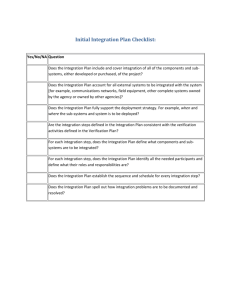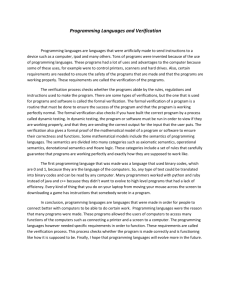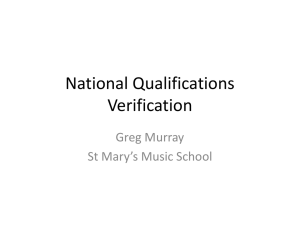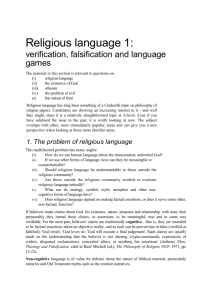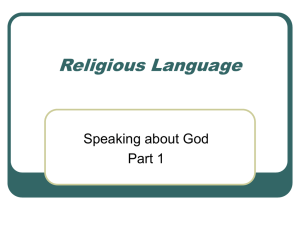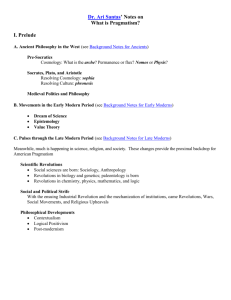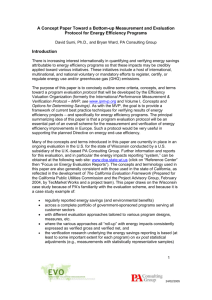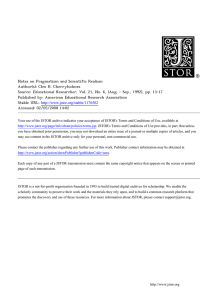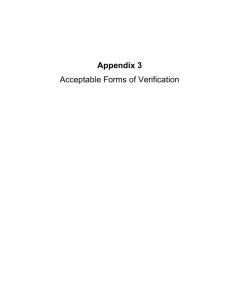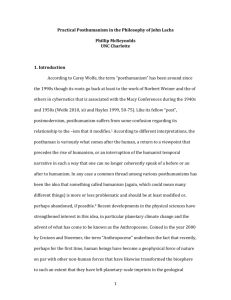Pragmatism
advertisement
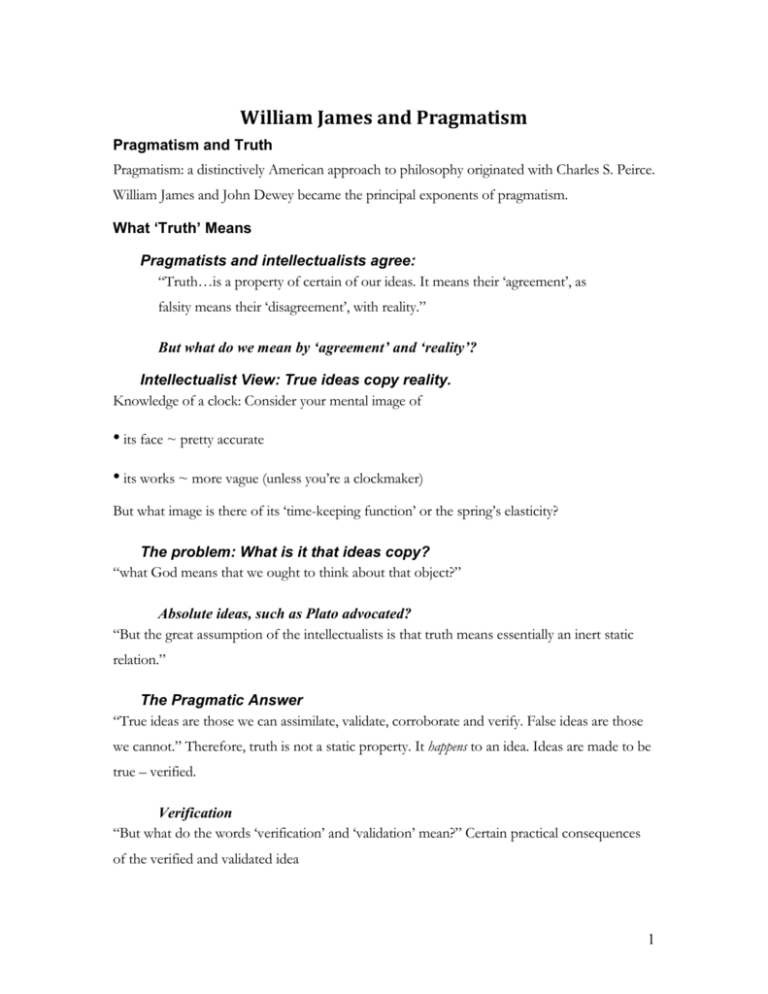
William James and Pragmatism Pragmatism and Truth Pragmatism: a distinctively American approach to philosophy originated with Charles S. Peirce. William James and John Dewey became the principal exponents of pragmatism. What ‘Truth’ Means Pragmatists and intellectualists agree: “Truth…is a property of certain of our ideas. It means their ‘agreement’, as falsity means their ‘disagreement’, with reality.” But what do we mean by ‘agreement’ and ‘reality’? Intellectualist View: True ideas copy reality. Knowledge of a clock: Consider your mental image of • its face ~ pretty accurate • its works ~ more vague (unless you’re a clockmaker) But what image is there of its ‘time-keeping function’ or the spring’s elasticity? The problem: What is it that ideas copy? “what God means that we ought to think about that object?” Absolute ideas, such as Plato advocated? “But the great assumption of the intellectualists is that truth means essentially an inert static relation.” The Pragmatic Answer “True ideas are those we can assimilate, validate, corroborate and verify. False ideas are those we cannot.” Therefore, truth is not a static property. It happens to an idea. Ideas are made to be true – verified. Verification “But what do the words ‘verification’ and ‘validation’ mean?” Certain practical consequences of the verified and validated idea 1 “They lead us, namely, through the acts and other ideas which they instigate into or up to, or towards, other parts of experience with which we feel […] that the original ideas remain in agreement.” Truth as a Practical Need “The possession of truth, so far from being an end in itself, is only a preliminary means towards other vital satisfactions.” Example of being lost in the woods. Useful because true – true because useful. “‘True’ is the name for whatever idea starts the verification process; ‘useful’ is the name for its completed function in experience.” Pragmatic Notion of Truth Truth is “something essentially bound up with the way in which one moment in our experience may lead us towards other moments which it will be worthwhile to have been led to.” It is a “leading that is worthwhile” So what is real? “Things of common sense, sensibly present or commonsense relations, such as dates, places, distances, kinds, activities” “Such simply and fully verified leadings are certainly the originals and prototypes of the truth process.” We assume things to be true and rely on them, at least until they fail us. Ultimately, truths trace back to someone's “face-to-face verification.” Truth on Credit “You accept my verification of one thing, I yours of another. We trade on each other’s truth. But beliefs verified concretely by somebody are the posts of the whole superstructure.” Truth and General Classes If we verify an idea about one specimen, we expect it to hold for other things like it. The mind “habitually” applies this kind of verification. “Indirectly or only potentially verifying processes may thus be true as well as full verification processes.” 2 “Making” Truth “Truth for us is simply a collective name for verification processes, just as health, wealth, strength, etc. are names for other processes connected with life […] Truth is made, just as health, wealth, and strength are made, in the course of experience.” Rationalist Objection “Truth is not made; […] it absolutely obtains, being a unique relation that does not wait upon any process.” A belief about the clock on yonder wall is true already, even before anyone should verify it. Pragmatists put the cart before the horse. States vs. Processes Truth is a process, like wealth, health and strength. “We know that wealth is but a name for concrete processes that certain men’s lives play a part in, and not a natural excellence found in Messrs. Rockefeller and Carnegie...” ‘Health’ is a name for processes such as digestion, circulation, and sleep. Against the rationalists “‘The true’…is only the expedient in the way of our thinking, just as ‘the right’ is only the expedient in the way of our behaving.” The absolutely true is only an idea point toward which we imagine all our truths converge. Death of ‘Old truths’ Ptolemaic astronomy, Euclidean space, Aristotelian logic, Scholastic metaphysics: (Now we might add Newtonian physics.) For centuries these were expedient, but absolutely speaking, they are false. Our Duty to Truth Rationalist: “Truth is a name for all those judgments which we find ourselves under obligation to make by a kind of imperative duty.” James: “Our obligation to seek truth is part of our general obligation to do what pays. The payment true ideas bring are the sole why of our duty to follow them.” 3 James’ conclusion Like Hume, James is anti-metaphysical. The point, for James, is action and experience. We need to get on in life and the idea of truth helps us.Whatever idea gets us ahead is true. Pragmatism & Evolution James’ theory has found new life lately. Evolutionary theorists see thought and language as survival adaptations. True ideas are those that make an individual or community better fit to survive. Not the Last Word James does not necessarily have the last word. Is knowledge only for power, for successful activity? Aristotle said we want knowledge for its own sake. As we shall see, James’ approach falls short when we ask ultimate questions about reality. 4
